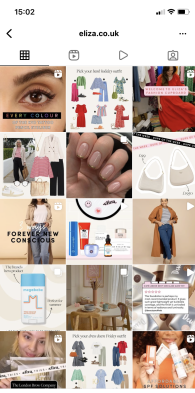
Mail and Metro publisher DMGT is targeting millennial women with a new fashion and beauty brand, Eliza.
By launching on Instagram in January and on Tiktok last month ahead of the website coming this week, Eliza has already been a social-first landmark for DMGT.
Eliza editor Joanna Bridger (pictured), who has worked at DMGT for nearly a decade, most recently as features director for the Mail on Sunday’s You magazine, told Press Gazette that millennial women are a demographic the company currently does not “necessarily provide for specifically”.
Eliza is a fashion and beauty brand that aims to be “really fun and relatable and approachable”. Bridger believes its USP over existing magazine brands and their websites will be a focus on the “real woman” and high street, as well as smarter and more sustainable, shopping.
“Looking at what’s already out there it can be sometimes a bit disheartening because the price point of some places is so high or you might look at a dress round-up and everything’s over £300 and so that’s been a real priority on Eliza,” she said.
The launch was spurred on by the fact shopping habits had changed during the Covid-19 pandemic. Bridger said DMGT realised there was “an opportunity in how the world was changing post-pandemic and knowing that that was very much focusing on an audience that we didn’t really tap into”.
The team, currently eight in editorial and about 15 in total, is predominantly made up of women – including its editor, publisher, MD, creative director and head of tech – in another exciting step for DMGT. The brand has been “created by women for women”, Bridger explained.
“What’s brilliant about Eliza,” she said, “[is] our team are the audience, and it’s the first time actually in my career that I’ve worked on something that’s for me and my age group and the people that I know and I’ve worked with.”
The brand benefits from having lots of support from the wider DMGT team including Mail Newspapers editor Ted Verity, who was said to be “excited” about Eliza. But Bridger said they want to “create our own identity under the umbrella” and that they are “balancing this start-up energy with the conglomerate that is DMGT”.

Instagram grid of Eliza, DMGT’s new fashion and beauty brand for millennial women.
“Eliza essentially in a nutshell is a modern or a digital shopping companion,” Bridger said. “We’re a content brand first and our main area of focus is our website, which will be very content-led, but our socials are incredibly important to us because that’s where our audience are.”
On Instagram, Eliza has had more than two million account impressions since its January launch and has built a following of almost 19,000.
The audience there is mostly aged 25 to 34 which fits with the aim for the brand, based on data used by DMGT which showed that women shopping for fashion products made up 62% of the total UK online retail share for physical goods in the past year, and that 70% of all purchases were made by millennial women.
Another DMGT first is Eliza’s approach to Tiktok, Bridger said. Although Mail Online is the biggest publisher on the platform with a following of 3.8 million, its account is run from the Daily Mail US newsroom.
Eliza joined Tiktok on 23 May and is hoping to tap into a slightly younger audience – “the younger millennials and the Gen Z audience”, Bridger said, although she acknowledged Tiktok is spreading to older audiences and therefore skewing it a bit. “So we may find that it’s still a similar audience to what we get on Instagram.”
But she said the approach to Tiktok would be “much more laid back” and “lo-fi” compared to their “polished” and “more managed” approach to Instagram.
“Whereas on Tiktok we are sort of giving people an insight into the Eliza fashion cupboard, which can be incredibly messy, and some of our videos so far have been out shopping with the team and it’s literally just sort of a pick up and we’re filming it kind of thing. So it’s a lot more laid back and reactive.”
Because of this emphasis on social and video, Bridger said she has not just hired “traditional journalists” but tried to build a “network of content creators” – another first for DMGT.
“So people aren’t just coming to us to write but we’re really prioritising video and social content on the site and on socials just because it goes hand in hand with shopping really, we know that people want to see how dresses move, how fabrics move, how mascara looks or how lipstick looks,” Bridger said.
She hopes this approach, which will mean staff become personalities and known to the audience almost like hybrid journalists and influencers, “gives us a connection to the audience that we haven’t had before”.
“A big part of the Eliza ethos, and one of the reasons it’s called Eliza, is because we wanted people to be able to relate to it almost as a person or as a network of people. So by giving it a woman’s name, we want it to feel like someone that you can ask fashion questions to or beauty questions…” Bridger said.
Commercially, Instagram and the website are primarily affiliate-based, telling people where they can buy the products they see.
“On top of that we really want to push the content and sell ourselves as content creators to lead us to brand partnerships down the line,” Bridger added.
The website is not hosting programmatic advertising at launch: “We’re in this amazing opportunity where we’re launching very slowly and very softly and the whole summer we plan on testing and learning and seeing how it goes and how people interact with it and what’s annoying and what’s not,” Bridger said.
There are similar expectations of editorial growth, with a planned expansion into lifestyle such as interiors and homes. “We’ve got big ambitions but we’re taking it slow.”
Picture: Joanna Bridger
Email pged@pressgazette.co.uk to point out mistakes, provide story tips or send in a letter for publication on our "Letters Page" blog
